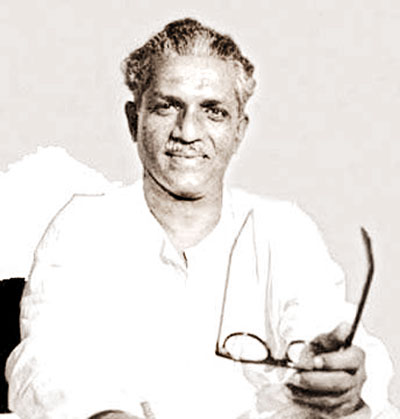Sunday Times 2
Legacy of Philip Gunawardena
View(s):- His experience in radicalism, socialism and nationalism provides lessons for today’s leftists
By Sugeeswara Senadhira

His courage was legendary and it earned him the sobriquet ‘Boralugoda Lion’. Although Philip was known as the ‘Father of Marxism in Ceylon’ in his radical days when he launched the Lanka Sama Samaja Party (LSSP) together with N.M. Perera, Colvin R. de Silva and other pioneers of the left movement, he soon realised the need to transform the foreign doctrine to meet Sri Lankans’ aspirations. Hence, he launched the new vision of ‘National Socialism’ loosely translated as ‘Jathika Samajavadaya’.
As a youth, he followed a radical revolutionary path that made him work in close collaboration with socialist leaders of many countries, including the United Kingdom, the United States, Spain and India. In New York, he joined the radical group headed by José Vasconcelos Calderón, called the “Cultural Caudillo” of the Mexican Revolution. Calderón was an important Mexican writer, philosopher, and politician. He was one of the most influential and controversial personalities in the development of modern Mexico.
Recalling the visit of the niece of Mexican revolutionist Calderón to Sri Lanka, Philip’s daughter Lakmini Gunawardena told this writer some years ago: “My father met her and worked with such other people who join freedom struggles in Spain.”
In London, Philip closely associated with India’s socialist leaders such as Jayaprakash Narayan, Jawaharlal Nehru and Krishna Menon, and Kenya’s anti-colonialist leader Jomo Kenyatta. He assisted Spanish revolutionaries and helped them to smuggle revolutionary documents through the Pyrenees range of mountains, thus avoiding border checkpoints between Spain and France.
After returning to Sri Lanka to launch the LSSP, the party’s famous Suriyamal Campaign and social activities during the Malaria epidemic, he continued to maintain close contacts with the Indian socialist leaders. This became useful when he crossed over to India with colleagues NM, Colvin and others after breaking out of Batticaloa Jail where he was imprisoned by the colonial rulers. He took part in the Indian freedom struggle campaigns while hiding in India until the colonial police captured him and his wife Kusuma and imprisoned them in Bombay Jail.
As a Trotskyite, Philip focused his vision of Trotskyism blending it with nationalism, rather than totally devoting his vision to Marxist theories. The new-found ‘Social Nationalism’ could easily blend with S.W.R.D. Bandaranaike’s middle path and the new pancha maha balawegaya consisting of the Buddhist clergy, indigenous physicians, teachers, peasants and workers. This brought the newly formed Mahajana Eksath Peramuna (MEP) coalition to power in 1956.
After parting ways with Bandaranaike a few months before the tragic death of Bandaranaike, Philip decided not to revive his Revolutionary Lanka Sama Samaja Party (VLSSP). Instead, he became the leader of the MEP, a party which followed the left of the middle path.
As the eminent administrator and academic-turned-politician, Dr. Sarath Amunugama, said, on socialism itself, Philip had a different perspective from the red-shirted comrade shouting himself hoarse on May Day: “You talk of Socialism. You cannot socialise poverty. You can only socialise plenty. And if people cannot work, if they cannot produce, you cannot have socialism.” This was probably an admonition to the government of the day which was claiming to be socialist.
Prominent economist Professor A.V.D.S. Indraratne, taking a look at Philip’s achievements, said he brought Marxism to the rural peasants through his Jathika Samajavadaya.
Today, radical socialist parties are faced with an identity crisis. They are highly perturbed by the non-acceptance of their policies by the vast majority of the people, though they are popular with the youth segment of society. They can learn a lesson from left-wing nationalism or leftist nationalism adopted by Philip. During the colonial era, he used it as a policy of anti-imperialism and the national liberation movement. In independent Sri Lanka, his policy was based upon national self-determination, popular sovereignty, national self-interest, and principles such as social equality.
This is quite evident from his speeches. Speaking in the course of the Budget debate on October 11, 1960, Philip, then a member of the Opposition, said, “In our country with its accent on political illiteracy, there is the danger of a class struggle between the ignorant and the educated. The modern world is a complex world; its technological problems need a cultivated understanding. The fact that new ideas and learning mostly come to our country through a foreign language creates new barriers between the educated elite and the unsophisticated people. The new ideas and learning do not naturally seep down, fail to become a part of the heritage and the consciousness of the people and they remain a monopoly of the new nationalisation of modern knowledge which is the sine qua non of effective democracy and socialism in our country.”
The relevance of Philip’s vision can be encapsulated in another segment of his speech. “The growing divorce between words and their meaning is a major tragedy of our times. Socialism, Democracy, Peace, Freedom are used in a manner that makes them not only meaningless but topsy-turvy. The fluidity in the meaning of words creates crisis in communication. Words instead of clarifying and crystallising thoughts confuse them. Today counterfeiters have seized the temple of Saraswathi. As false coins bring about the breakdown of an economy and society, so counterfeiters in language destroy popular confidence. Dull indifference is the only response when not the goblet alone but the grapes are without wine.”

